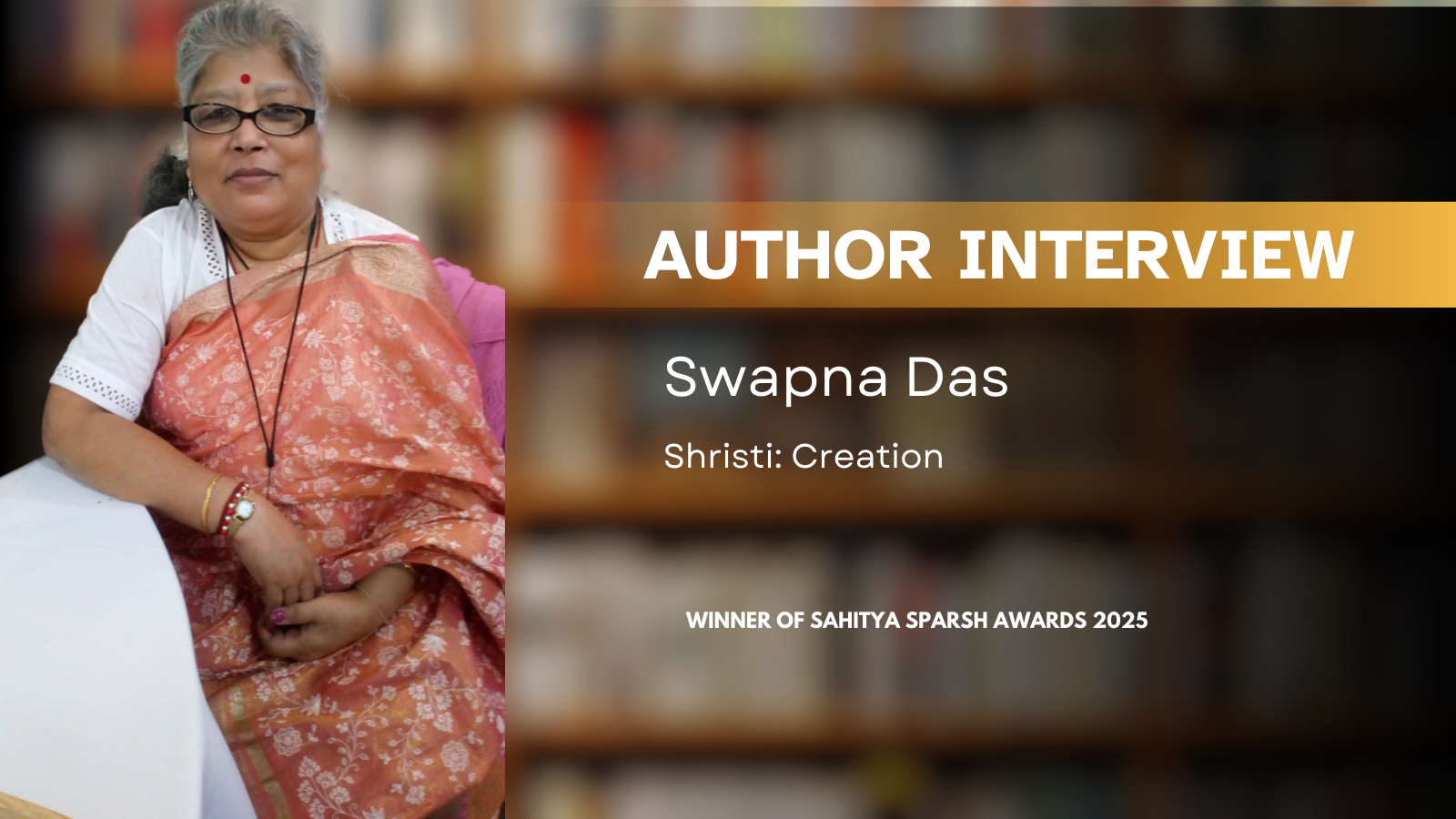Can you tell us about your inspiration behind writing Shristi: Creation? What motivated you to explore philosophical fiction?
Swapna Das: River (water) was the main inspiration to write Shristi:Creation. Waterworld is an example of the journey of the river to reach its final destination – the ocean. Just like we journey through life seeking for our final destination. The river’s expedition through different landscapes tells a unique and silent story. For me Creation: Shristi is a unassuming effort on the revelation of the Creator. The different exhibitions of design has been an overwhelming discovery – some good and a few not so good, nonetheless it is all part of the divine plan. The stories in the book are varied and gives the reader the opportunity to perceive life through the lens of a writer.
To understand life and its deeper meaning, I take a dive into the realm of philosophy to be a guide and tutor. I seek to narrate the stories in an attempt to understand the magic of life and conception with subtle messages and tools for self introspection.
Your book delves into profound themes such as Omnipresence and the wonders of creation. How did you approach integrating these complex ideas into a narrative that’s accessible for readers?
Swapna Das: The Omnipresence is the Divine energy that engulfs the universe and shapes and foretells life on earth (and may be in another galaxy). My experience about energy is a very positive one despite the trials and tribulations in life. The Divine has been a constant and invisible companion in my life, at times as a Mentor whilst at other times as a Positive Energy. Therefore it is natural that I would dedicate Shristi;Creation to the Creator and narrate His/Her manifestations of life, underscoring it with a philosophical style.
.
As an author with a background in English literature, how do you think your academic journey influenced your writing style and storytelling?
Swapna Das: English and Indian literature has blessed me with confidence with words and imagination – to quote “dare to dream and you can achieve anything”.
My academic journey in English literature was as a result of my appreciation and admiration for the subject. The works of many great writers of that time has influenced me as I have attempted to imbibe a few of the writing qualities needed for literature. Extensive reading at a young age has left an imprint of fascinating stories in my creative mind. The imagery and story-telling in literature has been a spell-binding experience for me and, to a great extent, influenced my writing.
Your books often touch on deep, universal themes. What do you hope readers will take away from Shristi: Creation after reading it?
Swapna Das: Shristi:Creation was aimed to have a profound impact on the reader. It is not written as a religious text book. The universal design as I perceive it, will hopefully clue the reader to understand and appreciate the fairy-tale journey of life and the universe. . This is the main take away from Shristi:Creation. My humble effort to construct the universal appeal and design was both enriching and a modest experience for me. I hope the reader will enjoy the literary journey in Shristi:Creation.with this in mind.
How do you balance philosophical concepts with engaging storytelling to ensure that readers stay connected with the plot and characters?
Swapna Das: I see myself as a story teller therefore writing an engaging story is an integral part of my craft. In the stories and poems I have also balanced the “thinking” and balance it with the central theme of the stories – The Sunset, Planets of the Gods, Gandhari and other stories touch on a certain viewpoint and catches the imagination of the reader at the same time. The short stories are a recognition of the theory of ‘short and sweet’.
Could you share some of the challenges you faced while writing Shristi: Creation and how you overcame them?
Swapna Das: The significant challenge for writing Shristi:Creation was connected with the account of Waterworld. The inspiration to write about river (water) was dotted with hesitation, self doubt and the application of rhyme scheme in the poem. The continuous writing of the poem faltered many times, but with the persistence and determination, it slowly removed the obstacles and the poem emerged from a miniscule idea to a grand tapestry of imagery. This was possible due to the fact that although time consuming, the author re-read every line of the poem repeatedly, making alterations to amplify the story, and re-visited the previous lines to make sense of the journey of the river. I also researched my subject (river) and sought inspiration from the universe to write Waterworld and the other stories in Shristi:Creation. Cultivating a fertile imagination from the start of my writing career also helped me to create a fiction book modelled on a grand them especially in the Waterworld..
How does your extensive travel experience and exposure to various cultures influence your writing and the way you approach character development and world-building?
Swapna Das: The main reason for me visiting places of artistic importance is to appreciate and experience history that helped me to travel back in time. I understand that artefacts of historical and cultural importance has its role to play in the modern world and I have tried to incorporate some of its imagery in my writings. A few chapters in many of the short stories/poems like The Magical Pen, Malini’s Doll House, The Hunter and the Hunted, Nitai to name a few have inspirational connection to museums/art galleries/places I have visited.
The inspiration to write The Forgotten People came after a short visit to a remote part of West Bengal a few years ago. The fictional characters in the book is a direct result of my observations of the people of the land, its landscape and traditions and cultures. The fictional story was set in the backdrop of a forgotten tribe and a significant time on research was needed to narrate the story.
You’ve written books such as A String of Pearls and The Forgotten People prior to Shristi. How do you feel your writing has evolved from one book to the next?
Swapna Das: Whilst A String of Pearls is a collection of short stories, The Forgotten People is a novel. This short journey has given me the opportunity to explore the wide scope of literary writing. It has stimulated me to engage in varied subjects from fantasy writing to real life stories. The fictional works have been an important self growth process for me as a writer. On the other hand Shristi:Creation has seen me evolve as a thought provoking writer guided by profundity and thinking. All the three books have different goals and messages, therefore I have tried to avoid being type-cast as an author whilst maintaining the creative abilities of writing in all of these books.
How does it feel to have Shristi: Creation recognized with the Sahitya Sparsh Awards 2025 in the Philosophical Fiction category, and what does this recognition mean to you as an author?
Swapna Das: I feel both elated and humbled by the experience of winning the Sahitya Sparsh Award 2025 in a challenging category – Philosophical Fiction. My family and friends feel extremely proud for me and are also very happy. I am also very happy with this honour and feel rewarded. I thank the panel of judges for honouring me with the award and also a big shout out to Sahitya Sparsh Award organisers for recognising the efforts of authors who leave footprints of their craft in the world. Big congratulations also to all the winners of this year’s award and please continue to write and grow. Thank you.
Looking ahead, what can your readers expect from you next? Are there any new projects or genres you’re exploring in your upcoming work?
Swapna Das: I have plans to write more enchanting stories for my readers in the coming years. So watch out for this space!




